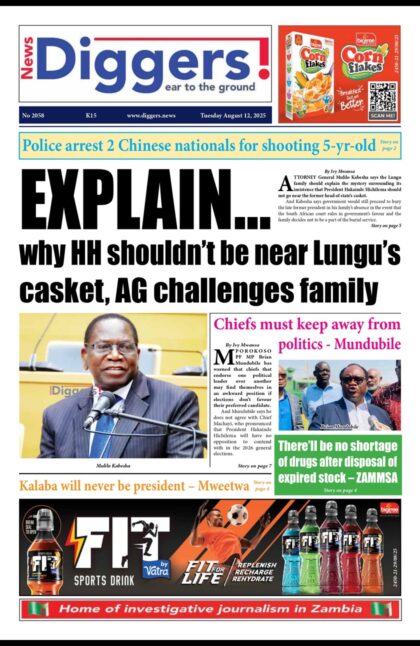The Zambia Chamber of Mines has disagreed with the sentiments made by newly-appointed Finance Minister Dr Bwalya Ng’andu that declining copper production is not linked to the 2019 mining fiscal regime.
And the Chamber has called for consistency in implementing a stable mining tax regime if Zambia’s mining sector is to record any meaningful development.
Last Wednesday, during his maiden briefing on the economy, Dr Ng’andu said that Zambia’s declining copper production should not be linked to the 2019 mining fiscal regime as the real factors were largely attributable to pricing and low grades of copper, among other fundamentals.
But in an interview with News Diggers! Chamber of Mines president Goodwell Mateyo argued that the current tax regime was not attractive as some companies had halted expansion projects following the fiscal regime’s implementation back on January 1, 2019.
“If you look at Kalungwishi, the import duty on copper concentrate from Congo (DR) has simply resulted in them not producing any copper at all. So, it’s not entirely true that they are unrelated. They are directly related; investors come with all their money entirely because of the tax regime. If you talk about FQM (First Quantum Minerals) not investing in their expansion plan, (it) has a lot to do with the current mining tax regime so it’s not entirely true to say the tax regime and production are unrelated, it is related, except in some cases the relation is more direct than others,” Mateyo said.
“There is a correlation because I think if you remember when we did a brief at the beginning of this year when we were talking about the possible effects, what we did say (was) what can happen is companies are going to start turning back on expansion plans, which will eventually result in reduced output.”
Mateyo, however, noted that reduced copper production at Konkola Copper Mines (KCM) Plc was not directly related to the 2019 mining fiscal regime.
“The other thing that has happened, such as KCM, which are not directly related, the loss of production, for example at KCM, is not directly related to this, but one other thing that you must bear in mind concerning KCM is that the fiscal regime wasn’t conducive enough to attract and to bring in the capital that was necessarily needed for the mine,” he added.
And Mateyo, who is also Mopani Copper Mines’ general legal counsel, called on government to be consistent with implementing a stable tax regime as the inconsistencies seen in recent years had a negative effect on the sector.
“Actually, we are supposed to pay taxes just like any other productive aspect of the economy, but what we are saying is that it should be fair taxes, not taxes that drive producers to start turning back on expansion plans; that actually encourage producers to pump in capital in to their operations. It’s two things: fair taxes and also consistency with the tax. We have no problem with paying the taxes, but approximately every 18 months, we have to be sure of where we are,” said Mateyo.

























One Response
What exactly is the purpose and intent of the Chamber of mines?